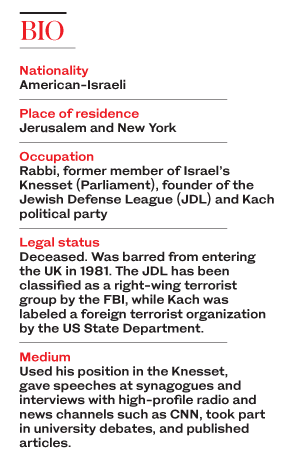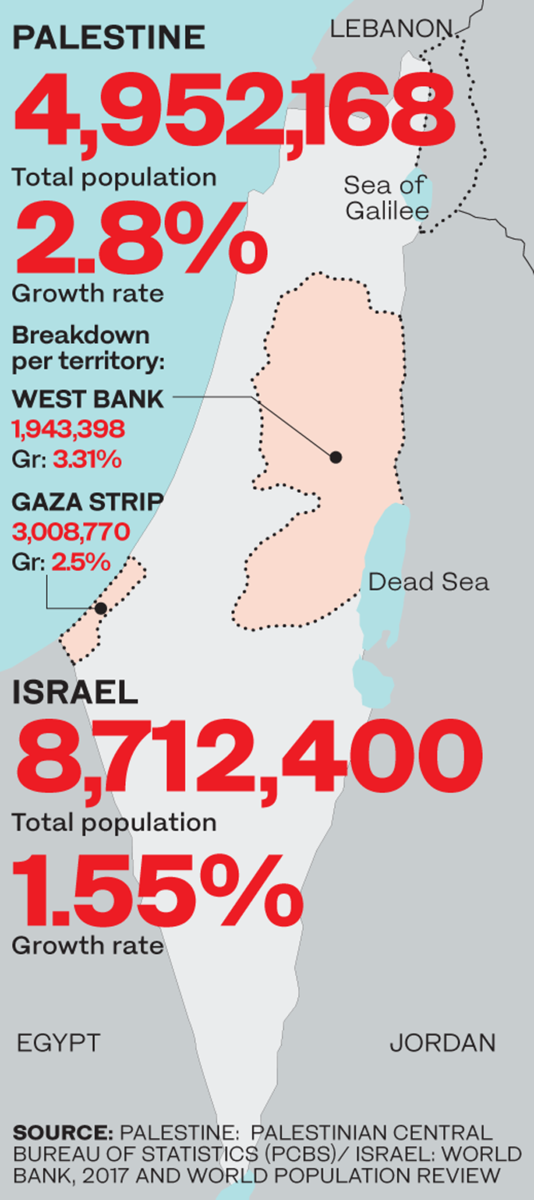Meir Kahane grew up in Brooklyn, in an atmosphere of anti-Arab and anti-Muslim hatred fostered by his father, who entertained in his home Jewish Zionist fanatics such as Ze’ev Jabotinsky, founder of the Irgun terrorist organization and mentor to British Mandate-era terrorist Menachem Begin.
Kahane’s extremist ideology was nurtured by his parents and associations, and in 1968 he founded the Jewish Defense League (JDL), which the FBI describes as a terrorist organization.
He used his rhetoric to build a strong following, and was elected to Israel’s Knesset (Parliament), where he served one full term. Although Kahane was assassinated in November 1990, his extremism endures until today, not only among his followers in the US but in Israel, too. 
He began as a militant protesting against communism in the 1950s and 1960s, when he was hired as the rabbi for a conservative, later more orthodox, synagogue congregation in Howard Beach. There, he had great public influence, including preparing the singer Arlo Guthrie for his Bar Mitzvah.
Kahane received praise from other Jewish musicians, including Bob Dylan, who attended JDL meetings. Dylan described him, in a Time magazine interview in 1971, as “a sincere guy.”
But Kahane’s open militancy caused him to lose his rabbinical position, and he began publishing articles and books encouraging “Jewish militancy,” particularly against the Soviet Union, the Arab world and Palestinians, especially those living in Israel and under Israeli occupation. JDL members were suspected in, and accused of, numerous acts of violence throughout the US against Arab and Soviet properties.
The FBI identified three of Kahane’s JDL disciples — Robert Manning, Keith Fuchs and Andy Green — as the primary suspects in the murder of Christian Palestinian activist Alex Odeh, West Coast director of the American-Arab Anti-Discrimination Committee (ADC), in California on Oct. 11, 1985. Odeh was killed by a bomb that exploded when he entered his ADC offices that morning.
Manning, Fuchs and Green fled to Israel, where they were given sanctuary and lived in the illegal Jewish settlement of Kiryat Arba, near Hebron. Manning was later extradited to the US, and was charged and convicted in other violent acts related to his JDL membership. JDL militants were suspected in many acts of violence, yet continued to assume high-profile roles in the US and in Israel, where they spouted their virulent ideology of hate.

In June 1978, Kahane held a press conference in Chicago in front of the national headquarters of the National Socialist Party of America. I was a reporter at the time, and covered the press conference. Before it began, Kahane pointed to me and asked: “What are you?” I said I was American, Arab and Palestinian. He announced at the press conference that he would not take questions from me.
Kahane was assassinated on Nov. 5, 1990, by Egyptian-American El Sayyid Nosair. A park in Kiryat Arba was named in Kahane’s honor by the settlement’s leadership. Four years later, a memorial was established near Kahane Park in honor of one of his disciples, Dr. Baruch Goldstein, an American Israeli who was serving in the Israeli military.
On Feb. 25, 1994, Goldstein was with Israeli soldiers at the Ibrahimi Mosque in Hebron when he used his automatic weapon to massacre 29 Muslims as they prayed. He was a member of the JDL and Kahane’s Kach political party.
Kahane has had a profound influence on Israeli politics and the growth of anti-Arab extremism in the country. Although his rhetoric was denounced by mainstream Jewish-American groups such as the Anti-Defamation League and Israeli organizations, his following persists inside and outside Israel.
The emergence in Israel, prior to last month’s general election, of the Otzma Yehudit political party, led by Kahane disciple and former Kach leader Baruch Marzel, highlights the durability of ultra-religious nationalist ideology on the far right of Israeli politics. It also demonstrates that the radicalization that extreme ideologues take forward in life can endure after their death.
Prior to the election, Prime Minister Benjamin Netanyahu reached out to Otzma Yehudit to bring it into his own coalition. This demonstrates how in Israel’s political system, even small extremist parties can play a role in government when more mainstream political parties need a Knesset majority.
Israel’s Central Elections Committee allowed Otzma Yehudit to run in the election, but the Supreme Court intervened and banned it from doing so. Despite the ban, Otzma Yehudit’s activism keeps the flame of Kahanism alive.
ALSO READ:
• Abdul-Malik Al-Houthi: A wolf in sheep’s clothes
• Salman Al-Odah: The chameleon cleric
• Qaradawi and Qatar: the hate preacher who became Doha’s spiritual guide
• Brenton Tarrant: How the far right changed the face of terror

























